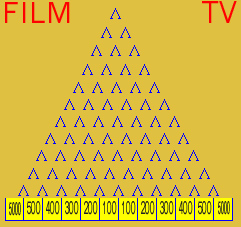
ABC Carnival '74
Across the Board
Baloney
Bamboozle
Be What You Want
Beat The Genius
Beat The Odds (1962)
Beat The Odds (1975)
Bedtime Stories
The Better Sex
The Big Money
The Big Payoff
Big Spenders
Blank Check
Body Language
Body Talk
The Buck Stops Here
Bullseye
Call My Bluff
Card Sharks (1996)
Casino
Caught in the Act
Celebrity Billiards
Celebrity Doubletalk
Celebrity Secrets
Celebrity Sweepstakes
Chain Letter (1964)
The Challengers (1974)
Change Partners
Child's Play
The Choice Is Yours
Combination Lock (1996)
Comedy Club
Concentration (1985)
The Confidence Game
Cop Out
Countdown (1974)
Countdown (1990)
The Couples Race
Crossword
Decisions, Decisions
Dollar a Second
Duel in the Daytime
The Fashion Show
Fast Friends
$50,000 a Minute
Finish Line (1975)
Finish Line (1990)
Get Rich Quick
Going, Going, Gone!
Head of the Class
High Rollers
Hollywood Squares (1965)
Hollywood Squares (1985)
The Honeymoon Game
Hot Numbers
Hot Potato
House to House
How Do You Like Your Eggs?
Jackpot (1984)
Jeopardy (1977)
Jokers Wild
Jumble
Key Witness
Keynotes (1986)
King of the Hill
Let's Make a Deal (1963)
Let's Make a Deal (1990)
The Love Experts
M'ama Non M'ama
Match Game (1962)
Match Game (1973)
Match Game (1990)
Match Game (1996)
MatchGame (2008)
Mindreaders
Missing Links
Monday Night QB
Money Words
Money in the Blank
Moneymaze
Monopoly (1987)
Nothing But the Truth
Now You See It (1986)
Oddball
100%
PDQ
Party Line
People On TV
Play For Keeps
Play Your Hunch
The Plot Thickens
Pot O' Gold
Pressure Point
The Price Is Right (1972)
Pyramid (1996)
Pyramid (1997)
A Question of Scruples
Quick as a Flash
Razzle Dazzle
Riddlers
Run For The Money
Says Who?
Scrabble (1990)
Second Guessers
Second Honeymoon
Sharaize
Shoot for the Stars
Shoot the Works
Shopping Spree
Show Me
Showoffs
Simon Says
$64,000 Question (2000)
Smart Alecks
Smart Money
Spellbinders
Spin-Off
Split Decision
Star Cluster
Star Play
Strictly Confidential
TKO
Talking Pictures (1968)
Talking Pictures (1976)
Tell It to Groucho
Temptation (1981)
$10,000 Sweep
Three of a Kind
Tic Tac Dough
Tie-Up
Top Secret
Twenty One (1982)
Twenty Questions
Twisters
Up and Over
The Waiting Game
We've Got Your Number
What Do You Want?
What's On Your Mind
Wheel of Fortune
Whew!
Whodunit
Whose Baby
Wipeout
Word Grabbers
Write Your Own Ticket
You Bet Your Life (1988)
You Bet Your Life (1991)
You're Putting Me On
Show a Random Pilot
Show Unreviewed Pilots
Bob Stewart Flow Chart
Pot O' Gold
Producer: Art James
Host: Art James
Taping Info: 1977
Made it to Air: No
When I say "Pascal's Triangle" you think Plinko. You really shouldn't, since Plinko isn't a true triangle. And, frankly, most of you don't have a clue what Pascal's Triangle is, but it is one of the most underutilized concepts in game shows that was first developed in China and refined by a 17th century French mathematician. One of its uses is permutations in figuring out the odds of a series of binary chances. Or, you can be Art James, add a leftover marble from The Magnificent Marble Machine and a make a game board out of it.
In this game, two contestants try to answer questions about either film or television. To start their turn, they drop a marble down the game board and it will land in any of the 12 spaces above. 46% of the time it should drop in either of the $100 slots, going all the way down to the $5,000 slots, which have a 1 in 1,024 chance of being pegged. Doubly odd was having the $5,000 spot, since you only needed $500 to win the game. The player was then given his or her question, and was awarded with the dollar amount if they answered the question correctly. If they answered incorrectly, the other player had a chance to answer the question for half the value.
In the first game of the pilot, the inequity of the format reared its ugly head. The score going into the fourth question was $400-$250. It was the turn of the player leading, and rolled a $500 film question. The question was a two-parter, he got the first one right and the second part wrong. Art James then gave the other player a chance to answer the other half, was right, and awarded the full $250 as well as the game to her. The other main game on this pilot had the first player reach $500 but gave the second player their turn, in which he equaled the score and they played overtime. Why wasn't the cheated player in the first game given the equal chance by having the other player miss the question and get his chance for half?
The bonus game involved trying to identify a number of film or TV shows from clips in a certain amount of time for a large prize. As you can tell, I have forgotten the details on all three. Also amazing was the terrible quality of many clips, looking like eighth generation copies with one of those generations involving a ViewMaster.
The clips cheapness, plus the somewhat unfairness of the main game marred what could have been a winner. Art James was Art James, laying back and letting the game be the star. Unfortunately, the star did not shine.
 A terrible rendition of the Pot O Gold board. I would like to thank the letter lambda for existing. |
This pilot has been viewed 9855 times since October 6, 2008 and was last modified on Dec 12, 2009 14:46 ET
Feedback? Contact me at usgs-pilot at the usgameshows dot net domain